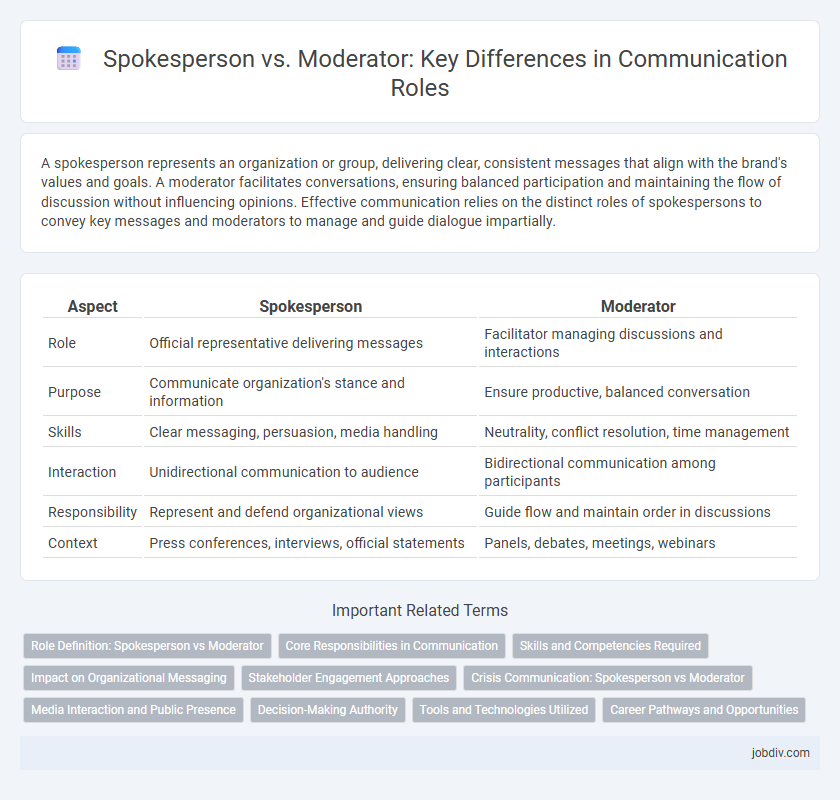A spokesperson represents an organization or group, delivering clear, consistent messages that align with the brand's values and goals. A moderator facilitates conversations, ensuring balanced participation and maintaining the flow of discussion without influencing opinions. Effective communication relies on the distinct roles of spokespersons to convey key messages and moderators to manage and guide dialogue impartially.
Table of Comparison
| Aspect | Spokesperson | Moderator |
|---|---|---|
| Role | Official representative delivering messages | Facilitator managing discussions and interactions |
| Purpose | Communicate organization's stance and information | Ensure productive, balanced conversation |
| Skills | Clear messaging, persuasion, media handling | Neutrality, conflict resolution, time management |
| Interaction | Unidirectional communication to audience | Bidirectional communication among participants |
| Responsibility | Represent and defend organizational views | Guide flow and maintain order in discussions |
| Context | Press conferences, interviews, official statements | Panels, debates, meetings, webinars |
Role Definition: Spokesperson vs Moderator
A spokesperson serves as the official voice of an organization, delivering key messages and representing the entity's stance during media interactions and public appearances. A moderator facilitates discussions or debates, ensuring fair dialogue, time management, and topic relevance without expressing personal opinions or organizational viewpoints. Clear role definition enhances communication effectiveness by distinguishing the spokesperson's responsibility for message control from the moderator's role in managing conversation flow.
Core Responsibilities in Communication
A spokesperson serves as the official voice of an organization, delivering key messages and representing the entity's stance in various communication channels. A moderator facilitates discussions, ensuring balanced participation and maintaining focus on the topic while managing the flow of conversation. While spokespeople communicate predefined messages, moderators emphasize neutral guidance and interaction management in dialogues.
Skills and Competencies Required
A spokesperson requires strong public speaking skills, persuasive communication, and deep knowledge of the organization's key messages to effectively represent its interests. A moderator must excel in active listening, impartial facilitation, and conflict resolution to manage discussions and ensure balanced participation. Both roles demand emotional intelligence and adaptability, but the spokesperson focuses on influencing audiences while the moderator prioritizes guiding conversations.
Impact on Organizational Messaging
A spokesperson directly shapes organizational messaging by delivering consistent, authoritative communication that reinforces brand identity and values. A moderator facilitates dialogue, guiding conversations to ensure clarity and inclusiveness without imposing specific viewpoints, thus maintaining neutrality. The choice between spokesperson and moderator impacts how messages are controlled, received, and adapted within stakeholder interactions.
Stakeholder Engagement Approaches
A spokesperson directly represents an organization's message to stakeholders, ensuring clear and consistent communication tailored to specific audience needs. In contrast, a moderator facilitates dialogue among diverse stakeholders, fostering collaborative discussions and managing varying viewpoints to achieve consensus. Both roles are essential in stakeholder engagement approaches, balancing message delivery with inclusive participation.
Crisis Communication: Spokesperson vs Moderator
In crisis communication, a spokesperson serves as the authoritative voice, delivering clear, consistent messages to maintain trust and manage the organization's public image. A moderator facilitates dialogue between stakeholders, ensuring transparent communication and addressing concerns to defuse tension. Effective crisis management requires leveraging the spokesperson's credibility while utilizing the moderator's skills to foster constructive engagement.
Media Interaction and Public Presence
A spokesperson serves as the official voice of an organization, delivering key messages and managing media relations to maintain a consistent public image. In contrast, a moderator facilitates discussions, ensuring balanced dialogue and guiding conversations without representing an entity's stance. Effective media interaction hinges on the spokesperson's clarity and message control, while a moderator's public presence emphasizes neutrality and engagement across diverse viewpoints.
Decision-Making Authority
A spokesperson holds decision-making authority by representing an organization's official stance and communicating strategic messages on its behalf. In contrast, a moderator facilitates discussions without influencing decisions or taking a position, ensuring balanced dialogue among participants. The distinction lies in the spokesperson's role in shaping and conveying decisions versus the moderator's neutral role in managing communication flow.
Tools and Technologies Utilized
Spokespersons typically leverage advanced communication tools such as teleprompters, media monitoring software, and social media management platforms to deliver consistent messages and engage with the audience effectively. Moderators utilize technologies like real-time polling systems, audience interaction apps, and collaborative video conferencing tools to facilitate discussions and manage multilateral communication flows. Both roles increasingly adopt AI-driven analytics and virtual event platforms to enhance clarity, engagement, and responsiveness during communication processes.
Career Pathways and Opportunities
A spokesperson typically builds a career in public relations, corporate communications, or media relations, focusing on representing organizations and delivering key messages to the public and press. In contrast, a moderator's career path often leads through event management, journalism, or academic fields, specializing in facilitating discussions, managing panels, and ensuring balanced dialogue. Both roles offer unique opportunities; spokespersons gain visibility and influence in brand reputation, while moderators develop expertise in engagement and conflict resolution.
Spokesperson vs Moderator Infographic

 jobdiv.com
jobdiv.com